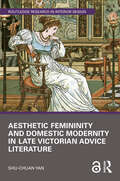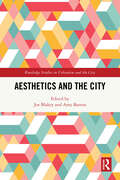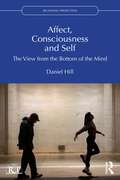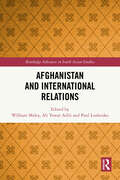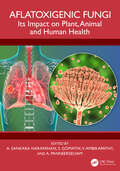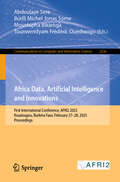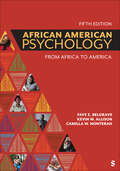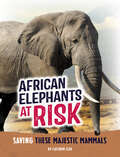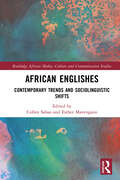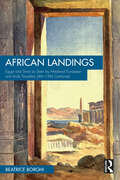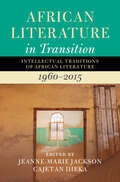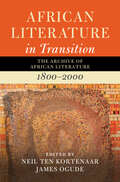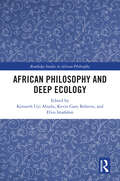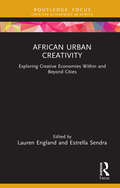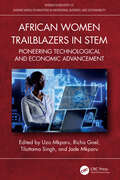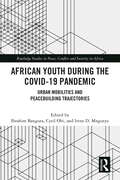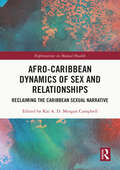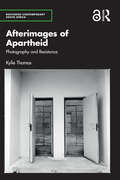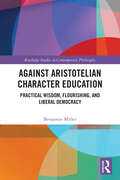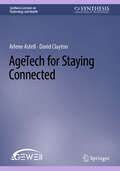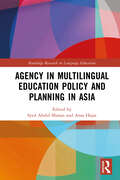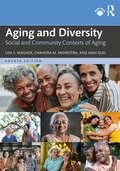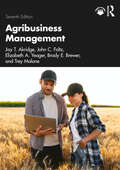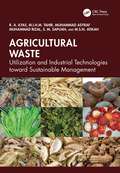- Table View
- List View
Aesthetic Femininity and Domestic Modernity in Late Victorian Advice Literature (Routledge Research in Interior Design)
by Shu-chuan YanAesthetic Femininity and Domestic Modernity in Late Victorian Advice Literature considers how the domestic interior is constituted, imag(in)ed, contested, and mediated in the public forum of advice literature. It interrogates the construction and negotiation of aesthetic femininity and domestic modernity within the larger contexts of the New Journalism, the New Art Criticism, a new girls’ culture, and the emerging New Woman phenomenon in Britain.This book presents extensive new search on women-authored advice literature, including domestic advice manuals, home decoration books, and periodicals for young girls and adult women, within the discourse of household art. Part One justifies girls’ presence in the cultivation of beauty and taste at home. The practice of home decoration can be appropriated as a mode of agency and subjectivity for a girl to articulate her own voice and specific positioning as she grows toward womanhood. Part Two uncovers the ways in which advice literature serves as a mediator of decorating practices to help foster the affinities between gentlewomen’s domestic bodies and decorated interiors.Aimed at an interdisciplinary audience, this book adds to the growing body of scholarship on the studies of home cultures, art and interior design, nineteenth-century studies, and the social history of women.Chapters 3 and 5 of this book are freely available as a downloadable Open Access PDF at http://www.taylorfrancis.com under a Creative Commons Attribution-Non Commercial-No Derivatives (CC BY-NC-ND) 4.0 license.
Aesthetics and the City (Routledge Studies in Urbanism and the City)
by Joe Blakey Amy BarronAesthetics and the City engages aesthetics to explore the role of the city in urban experience. Drawing on diverse theories and global case studies, this edited collection examines how aesthetics relates to how cities and urban spaces are perceived, organised, and transformed.This book celebrates and ponders the wide diversity of aesthetic approaches within urban studies, noting that the way aesthetics is understood impacts what can be understood about cities and the urban order more generally. In its most general sense, aesthetics refers to our sensuous relation to the world. It invariably figures in how we make sense of the city and ourselves—bound to how urban life is experienced imaginatively, materially, socially, culturally, and politically. In an era where scholars have expressed concern at epistemological city-centrism, aesthetics is proposed as a versatile concept through which the centrality of the city to urban thought can be assessed. The book also explores how aesthetics intersects with a range of tangential concepts including power, the political, art, and affect. Ultimately it makes the case that this diverse ensemble of approaches to aesthetics can enable scholars to understand the city and its enduring relevance to urban thought.This book focuses on the concepts of "aesthetics" and "the city" and will appeal to scholars and students in urban studies, human geography, planning, politics, and sociology.
Affect, Consciousness and Self: The View from the Bottom of the Mind (Relational Perspectives Book Series)
by Daniel HillThis book argues that mental life is organized by and around affect. It proposes a clinical model for understanding how affect influences states of consciousness and self. It illustrates how, from moment to moment, affect determines the world we know, how we are disposed to being in it, and our capacity to function in it.After introducing consciousness and self as features of mind that have posed daunting problems for philosophy, neurology, and psychoanalysis, subsequent chapters propose a model for understanding them at the clinical level. Initial chapters are devoted to the influence of affect on the structure and dynamics of normal waking consciousness and on the self’s capacity to act agentically, to relate intersubjectively, and to develop itself. Final chapters discuss disordered states of consciousness and impeded self‑functioning, due to affect dysregulation and what all this looks like in patients with preoccupied and avoidant attachment patterns.Drawing on psychoanalysis, attachment theory, interpersonal and affective neurobiology, and traumatology, this book offers a fresh perspective on the importance of affect for psychoanalysts and psychodynamic psychotherapists.
Afghanistan and International Relations (Routledge Advances in South Asian Studies)
by William Maley Paul Lushenko Ali Yawar AdiliThis book explores various dimensions of recent international relations scholarship, taking the case of Afghanistan as a point of departure for discussion of these different themes.Contributors investigate a broad range of topics, including international relations theory, the nature of global order, ‘othering’ discourses, diplomacy, international law, the transformation of war, terrorism, gender politics, social media, state building, democratisation, refugee movements, globalisation, and historical lessons. The Afghanistan case helps illuminate the complexities of all these areas of analysis, and the book takes the analysis of Afghanistan in new directions. Theoretically, the authors interrogate the Afghanistan case’s implications for international relations, and vice-versa, by integrating multiple and complementary global or structural, state or institutional, and behaviouralist or leader-centric lenses. Conceptually, the chapters bridge the gap between theory and practice, thus reflecting the emergence of a problem-oriented approach to international relations scholarship. Methodologically, the research design employed by the authors is best characterised as ‘analytical eclecticism’. The majority of contributors originate from Afghanistan, something which again makes this book notable, and all three editors have extensive experience from time spent in Afghanistan.Using the Afghan case to explicate the importance of the relevance of theory and its related concepts to international relations studies, this book will be of interest to researchers in the field of international relations, Asian and Middle East Studies.
Aflatoxigenic Fungi: Its Impact on Plant, Animal and Human Health
by A. Panneerselvam A. Sankara Narayanan S. Gomathi V. AmbikapathyAflatoxigenic fungi, primarily belonging to the Aspergillus genus (A. flavus, A. parasiticus), are responsible for producing aflatoxins—highly toxic and carcinogenic secondary metabolites. These fungi pose significant risks to plant health, animal health, and human well-being due to their widespread contamination of food and feed. Aflatoxigenic fungi impact plants by causing diseases, and yield loss leads to economic loss and contamination. In connection with animals, aflatoxigenic fungi create toxicity in livestock, contamination of animal products, mortality, and economic loss. Finally, concerning humans, aflatoxigenic fungi lead to acute toxicity, carcinogenic effects, immune suppression, and nutritional risk.Features: Provides a systemic review of the recent developments in aflatoxigenic fungi on various biotic organisms Includes an overview of the impact of aflatoxins on various plants and on the agricultural economy Describes the role of aflatoxins in human health, including infants and in cancer Contains special emphasis on the control of aflatoxigenic fungi by nanomaterials and plant bioactive components Discusses the detection of aflatoxigenic fungi by surface-enhanced Raman spectroscopy (SERS)
Africa Data, Artificial Intelligence and Innovations: First International Conference, AFRI2 2025, Koudougou, Burkina Faso, February 27–28, 2025, Proceedings (Communications in Computer and Information Science #2536)
by Abdoulaye Sere Borlli Michel Jonas Some Moustapha Bikienga Tounwendyam Frédéric OuedraogoThis volume constitutes the proceedings of 1st International Conference on Africa Data, Artificial Intelligence and Innovations, AFRI2 2025, in Koudougou, Burkina Faso, during February 27–28, 2025. The 14 full papers were presented in this volume were carefully reviewed and selected from 50 submissions. They focus on Artificial intelligence Application: Large language models (LLMs) ; Data Protection, Cybersecurity and system; Data analytic and Decision Making.
African American Psychology: From Africa to America
by Faye Z. Belgrave Kevin W. Allison Camilla W. NonterahAfrican American Psychology: From Africa to America provides a comprehensive and integrated introduction to the field. The Fifth Edition presents recent advances and developments in African American psychology, including new coverage of systematic and institutional racism, Black empowerment, COVID-19′s impact on Black communities, and increased attention to heterogeneity within the Black community.
African American Psychology: From Africa to America
by Faye Z. Belgrave Kevin W. Allison Camilla W. NonterahAfrican American Psychology: From Africa to America provides a comprehensive and integrated introduction to the field. The Fifth Edition presents recent advances and developments in African American psychology, including new coverage of systematic and institutional racism, Black empowerment, COVID-19′s impact on Black communities, and increased attention to heterogeneity within the Black community.
African Elephants at Risk
by Kathryn ClayAfrican elephants have behaviors and features that keep them safe from predators, from the herds they live in to their large size. But these elephants are endangered. Because of humans, their habitat is shrinking, and climate change is hurting their food supply and their health. Human hunters are also putting these creatures at risk. Readers will learn why African elephants are at risk, what it means to be endangered, and how people can help. Each title includes activities and trivia questions to help readers connect with the content.
African Englishes: Contemporary Trends and Sociolinguistic Shifts (Routledge African Media, Culture and Communication Studies)
by Esther Mavengano Collen SabaoThis book investigates the functions and linguistic forms of African Englishes, and what this means for languages indigenous to Africa.It examines the historical imposition of English on the continent, as part of a broader project of cultural imperialism, and traces its transformation from a colonial tool to a dynamic and diverse language, examining its set of contemporary usage patterns, and its likely future directions. Thorough diverse critical approaches, this book unpacks how language contact has given rise to distinct variations including second language varieties, pidgins and creoles, that are moulded by Africa´s linguistic and cultural diversity. Drawing on case studies from West, East, and Southern Africa, this book illuminates contemporary English usages in multilingual spaces, where cultural and linguistic plurality drive ongoing shifts in communication. More than just being a study of language change, this book calls for a reassessment of the future of African Englishes and their impact on indigenous languages.Thus, the book is an essential read for scholars and students in linguistics, African Studies, and World Englishes, as it contributes fresh insights into the intersections of language, culture, identity, and power in modern-day African lifeworlds.
African Landings: Egypt and Sinai as Seen by Medieval European and Arab Travellers (4th–15th Centuries)
by Beatrice BorghiThis book seeks to break free from Eurocentric historical perspectives of medieval-era travel through Egypt and Sinai by focusing on the testimonies of 4th to 15th-century travellers from the African continent, especially pilgrim diaries from the Arab Muslim Egyptian world.Humanity's past is the story of movements by peoples who reshaped and redefined their identity and reported their impressions to a gradually diversified public—migratory currents that transported not just goods but ideas, intellect, culture and inventions. Focusing on Egypt in the Middle Ages—its cities, its suburbs and hinterland, and the many faces of its landscape—can provide us with answers to topical issues, as well as a new and better understanding of Levantine Mediterranean history. These diaries tell of objects, calendars, written works and artworks, sculptures, frescoes, monuments, musical instruments, animals, foodstuffs, and finally, of material and immaterial heritages—all valuable sources for understanding world history and posing questions about their, and our own, preconceptions.This volume will be of interest to students, scholars, and general readers of medieval history, Mediterranean history, travel history, and religious history.
African Literature in Transition: Intellectual Traditions of African Literature, 1960–2015 (African Literature in Transition)
by Cajetan Iheka Jeanne-Marie JacksonThis volume provides scholars and students with a birds-eye view of the stories African literature has told about itself. It elaborates on Africa's contributions to an evolving, transnational literary vocabulary and though its organization around key terms rather than specific periods or national canons, Intellectual Traditions of African Literature also facilitates movement between and across African traditions: its framework is intrinsically comparative. As befits a project of this scale and versatility, its contributors are drawn from across professional ranks, areas of geographical and subfield expertise, and academies of origin. By contextualizing African literature within a larger set of literary terms and movements, it demonstrates that African literature is intrinsically worldly and transnational, even at points of local historical engagement.
African Literature in Transition: The Archive of African Literature, 1800–2000 (African Literature in Transition)
by Neil Ten Kortenaar James OgudeThis book offers a compelling new approach to African literatures as formed by and itself a form of collective memory. It explores the historical spaces and maps that African literature brings to the surface and re-imagines in novel ways. The stories that matter about what happened in the past together constitute a collective memory that African writers and readers draw upon to locate themselves within the world. The book examines the mental maps that define the imaginative fields in which African literary texts have meaning. They provide answers to the questions that producers of texts must respond to: where stories are set, who writers write for, why writers write and how texts engage in meaning-making. It grapples with how writers imagine themselves contributing to a literary historiography and how readers get to understand the context within which texts are produced.
African Philosophy and Deep Ecology (Routledge Studies in African Philosophy)
by Kenneth Uyi Abudu, Kevin Gary Behrens, and Elvis ImafidonThis book investigates African philosophical contributions to the concept of deep ecology, which advocates for rethinking human and non-human relationships within our ecosystems, by promoting the inherent and earned worth of all beings.With ecological crises impacting lives around the world, this book interrogates deep ecology thinking from African philosophical perspectives, highlighting the continent’s important ontological, epistemological, ethical, aesthetic, and broad philosophical contributions. The book investigates issues such as the eco-phenomenology of human / non-human animals’ relations, Ubuntu and the environment, the superiorist fallacy, environmental belongingness, the impact of colonization and modernity on non-human trauma, the politics of ecological narrative about African places, the question of moral status, African socialist perspectives, the question of degrowth, selective subordination, biodiversity loss, land ethics, the ontology of waste, and the concept of personhood in relation to global climate and ecological justice.Providing a significant intervention in our understanding of the ecological crises and our duties toward ecosystems and the non-human other in the twenty-first century, this book is an important read for researchers, advocates and other stakeholders working in the fields of environmental philosophy, climate change, indigenous studies, and African Studies.
African Urban Creativity: Exploring Creative Economies Within and Beyond Cities (Creative Economies in Africa)
by Lauren England Estrella SendraThe edited collection, African Urban Creativity: Exploring Creative Economies Within and Beyond the Cities, seeks to contribute to understanding creative economies in Africa, specifically the urban dynamics of creativity and the urbanisation of the creative economy. In doing so, it also acknowledges the role of the periphery and rural settings within their inputs and dialogic relation to the city.The book contains six original contributions from academic researchers and creative practitioners, bringing together a range of disciplinary perspectives and presenting case studies from across the continent (Ghana, Kenya, Nigeria, Senegal and South Africa). The book is structured in two parts. Part 1 explores different dynamics of urban culture, identities and local development opportunities. Part 2 focuses on the complex dialogue between cities and their peripheries or rural settings. The editors’ conclusions reflect key themes of leadership, social and cultural development and urban-rural connectivity, and present implications of policy and practice.This text provides readers with empirical insights from Africa that can lead to more research, debate and policy engagement on the sustainable development of creative economies in Africa. This edited collection launches the new book series Routledge Focus on Creative Economies in Africa.
African Women Trailblazers in STEM: Pioneering Technological and Economic Advancement (Women in Industry 4.0)
by Uzo Mkparu, Richa Goel, Tilottama Singh, and Jade MkparuDespite recent advancements, gender disparities in STEM disciplines remain a major concern worldwide, particularly in Africa. This book focuses on empowering women in STEM to highlight the barriers they face in accessing and excelling in these areas, as well as proposing concrete solutions to bridge this gap. Africa possesses a vast pool of untapped STEM talent, especially among women and this book aims to support women in entering and thriving in STEM careers by providing opportunities and support, leading to a more diverse and dynamic workforce.African Women Trailblazers in STEM: Pioneering Technological and Economic Advancement offers firsthand accounts of successful women in STEM fields across Africa, providing access to valuable data on economic innovation in the region. It sheds light on the challenges African women face in STEM and offers strategies to overcome them, showcasing the achievements of women in STEM and their contributions to the field. The book also explores the correlation between women in STEM in Africa and the Sustainable Development Goals, presenting case studies and data on the gender gap in STEM fields. Acknowledging the unique challenges women of diverse backgrounds face, including race, ethnicity, social status, and location, this book provides readers with a deeper understanding of the importance of inclusive empowerment strategies and how intersecting identities impact women's experiences in STEM fields.This book can educate stakeholders and policymakers on the importance of funding programs that promote gender equality and women's participation in STEM fields. By offering evidence-based recommendations, the book can influence policy decisions aimed at creating more inclusive and supportive environments for women in STEM education and professions.
African Youth during the COVID-19 Pandemic: Urban Mobilities and Peacebuilding Trajectories (Routledge Studies in Peace, Conflict and Security in Africa)
by Cyril Obi Ibrahim Bangura Irene D. MngutyoThis book investigates the lived experiences of Africa’s youth during the COVID-19 pandemic, tracing its impact on their mobilities, freedoms, and livelihoods.Bringing together diverse perspectives from across the continent, the book interrogates how African youth expressed their agency in urban spatial terms during the pandemic, by coping with, adapting, and responding to the deepening marginality, insecurity, inequalities and at the same time opportunities they faced. It further examines how young people navigated precarious spaces during the pandemic, and how the reaction of the state undermined or enhanced their experience. It also considers the question of gender and marginalised group dynamics, and discusses the pandemic’s implications for peace, social justice, security, and human development in Africa.The strong empirical evidence presented in this book will be an important resource for researchers across African sociology, health, politics, and peace and conflict studies.
Afro-Caribbean Dynamics of Sex and Relationships: Reclaiming the Caribbean Sexual Narrative (Explorations in Mental Health)
by Morgan Campbell, Kai A. D.Afro-Caribbean Dynamics of Sex and Relationships: Reclaiming the Caribbean Sexual Narrative examines the complexities of sexuality and relationships in the Caribbean, shaped by colonial legacies, cultural norms, and evolving gender roles.Through seven original research studies, it explores a wide range of topics related to sexuality and intimate relationships, including body image and sexual satisfaction, sexual socialization and communication, perceptions of unconventional relationships, the psychological impact of adverse childhood experiences on intimate relationships, family structure’s influence on sexual identity, sexual decision-making among Caribbean youth, and the intersections of mental health, trauma, and intimacy. This book challenges Eurocentric narratives, offering a culturally grounded framework for understanding Afro-Caribbean sexuality.Bridging psychology, sociology, and history, it is essential reading for scholars, researchers, and academics in gender, sexuality, Caribbean studies, and postcolonial mental health.
Afterimages of Apartheid: Photography and Resistance (Routledge Contemporary South Africa)
by Kylie ThomasAfterimages of Apartheid shows how photographs of the past can be mobilised as a critical tool for understanding the ongoing effects of apartheid in contemporary South Africa.Through close readings of significant images made during and after apartheid, the book shows how photography works as a means of documentation, commemoration, and resistance. Written by one of South Africa’s leading scholars of visual history, the book considers the ways in which photographs can be used to contest impunity for state violence. Afterimages includes chapters on the Sharpeville and Marikana massacres, on the re-opening of cases of human rights violations that remain unresolved in the aftermath of the South African Truth and Reconciliation Commission, and on contemporary protests against the post-apartheid state. The book makes a powerful case for the role of photographs in drawing the viewer into the past time they represent, issuing a call to the living to remember, respond, and react.This vivid account of the photography of apartheid will be of interest to students and researchers across the fields of South African history, visual studies, memory studies, art history, photography studies and transitional justice.
Against Aristotelian Character Education: Practical Wisdom, Flourishing, and Liberal Democracy (Routledge Studies in Contemporary Philosophy)
by Benjamin MillerThis book argues that Aristotelian character education cannot work in liberal democracies today. It shows that when we clearly understand the basic structure of Aristotle’s value theory and correctly grasp the core requirements of liberalism, we will see that they are incompatible with one another through and through.Neo-Aristotelian theories of character have been immensely influential, receiving endorsements from academics, educators, and elected representatives while establishing and influencing major academic centers and numerous K-12 schools, especially in the UK and US. This book argues that despite its meteoric rise and its widespread public influence, neo-Aristotelian character education should be rejected. The author argues that the underlying structure of the theory is incompatible with the sort of value pluralism and antipaternalism that liberal democracies require. The main features that make Aristotelianism attractive—its robust theory of human flourishing that grounds character and its account of the virtue of practical wisdom—are the very same features that make its educational theory illiberal. Understanding the problematic structure of neo-Aristotelian education helps us to better grasp the demands of liberal democracy while also bringing attention to the neglected question of how education for democratic citizenship can be made to fit with equal respect and tolerance of all liberal-compatible ways of living and worldviews.Against Aristotelian Character Education is essential reading for scholars and graduate students interested in philosophy of education, education theory, virtue ethics, practical wisdom, political theory, and Aristotle.
AgeTech for Staying Connected (Synthesis Lectures on Technology and Health)
by David Clayton Arlene AstellThis book is a brief introductory guide to the role AgeTech plays in staying connected in later life. It offers insight into current AgeTech research on staying connected and illustrates entry points for deploying such technologies through a range of personas and scenarios capturing the common circumstances that lead older people to become disconnected, lonely, and isolated. The book provides readers with an accessible resource for understanding what sorts of AgeTech are available, what developments have been made and are currently underway, and what evidence exists for current technologies. The rapid pace of development in AgeTech, particularly in the commercial sphere, along with the competing claims being made for the benefits of many items, makes this practical guidebook essential for researchers and developers, policymakers, service providers and caregivers, and older adults themselves. While not intended to be exhaustive, this book covers basic information on common obstacles and barriers to technology development and adoption, things to keep in mind when using technology, and making the most of what is available to support older adults in staying connected.
Agency in Multilingual Education Policy and Planning in Asia (Routledge Research in Language Education)
by Anas Hajar Syed Abdul MananManan and Hajar invite experts and seasoned researchers from Asian contexts to explore the nuanced dynamics of language policy and educational practices in Asia, underscoring the importance of understanding local agency at a micro-level. The chapters of this title engage in the critical exploration of the tensions between structure and agency, and spotlight the institutional constraints these micro-level actors face in the enactment of multilingual education policy and planning.The contributors’ chapters provide case study examples of local actors responses towards policies at the micro-level when creating potential spaces for multilingual pedagogies and possible affirmation of multilingual identities. It also provides an analysis of how and why micro-level actors engage in the exercise of their agency, and what motives drive their responses. The volume serves as a challenge to, with the hope to change, the normative assumptions, pervasive postcolonial hierarchies, and hierarchical multilingualism in favour of more egalitarian and inclusive multilingual policies and practices, both within and outside, the classroom. More specifically, the volume shares significant developments occurring around the role of agency in negotiating the prevailing Anglophonic and Anglonormative trends and practices. This book will be of value to researchers and postgraduate students working in the fields of language policy and planning, multilingualism and language education.
Aging and Diversity: Social and Community Contexts of Aging
by Lisa Wagner Man Guo Chandra M MehrotraAging and diversity intersect in important ways, as individuals from different backgrounds experience aging through distinct lenses shaped by traditions, values, and beliefs. As the older population in the United States is becoming more diverse, it is important to understand the characteristics, the potential, and the needs of this population.In this new and fully revised edition of Aging and Diversity, Lisa S.Wagner, Chandra Mehrotra, and Man Guo address key topics in diversity and aging, discussing how the aging experience is affected by not only race and ethnicity but also gender, religious affiliation, socioeconomic status, rural–urban community location, and sexual orientation and gender identity. Taking this broad view of human diversity allows the authors to convey some of the rich complexities facing aging populations—complexities that provide both challenges to meet the needs of a diverse population of elders and opportunities to learn how to live in a pluralistic society.Wagner, Mehrotra, and Guo present up-to-date knowledge and scholarship about aging and diversity in a way that engages readers in active learning, placing ongoing emphasis on developing readers’ knowledge and skills, fostering higher-order-thinking, and encouraging exploration of personal values and attitudes.
Agribusiness Management
by Elizabeth A. Yeager Jay T. Akridge John C. Foltz Brady E. Brewer Trey MaloneThis seventh edition of Agribusiness Management provides students and managers with a fundamental understanding of the key concepts needed to successfully manage food and agribusinesses in a rapidly changing, global, high-tech, consumer-oriented, and uncertain world.This leading text has been restructured and revised for this edition to make it even more relevant and accessible. Offering a contemporary focus that reflects the issues that agribusiness managers face today and are likely to face tomorrow, the book presents conceptual material in a pragmatic way with illustrations and examples that will help the reader understand how a specific concept works in practice. Its decision-making emphasis provides contemporary tools that readers will find useful when making decisions in the current and future business environment. Examples and case studies are used extensively, including new vignettes throughout the text to help students understand how to apply the material in an industry setting. This seventh edition includes a new chapter on strategic management, as well as more emphasis on supply chain management, and new agricultural technology and Artificial Intelligence (AI), and its use by agribusiness firms.The book is supported by a suite of digital learning resources, featuring PowerPoint slides and test bank questions for each chapter. It is an ideal text for all courses on management in the agribusiness industry.
Agricultural Waste: Utilization and Industrial Technologies toward Sustainable Management
by S. M. Sapuan R. A. Ilyas M. I. Tahir Muhammad Asyraf Rizal M.S.N. AtikahThis book provides a comprehensive overview of agricultural waste and its utilization in various industrial technologies for sustainable management. It covers a wide range of topics, including the characterization of agricultural waste, its environmental impacts, and its utilization in various industrial sectors. This book also discusses the latest technological advancements in the conversion of agricultural waste into value-added products and the opportunities and challenges associated with their implementation.Key Features: Discusses the environmental impacts of agricultural waste and the latest technological advancements in converting waste into value-added products Gives an overview of the use of agricultural waste in various industrial applications including biocomposite, pulp and paper, and bioenergy industries Considers economic, social, and environmental aspects of agricultural waste management Offers practical solutions for the effective utilization of agricultural waste toward sustainable development Offering a multidisciplinary approach, this book serves as a valuable resource for researchers, academics, policymakers, and engineers interested in the sustainable management of agricultural waste.
